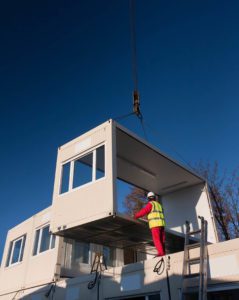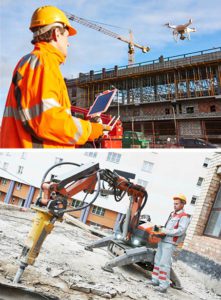December 31, 2025
Snow and Ice Management: Protecting Commercial Roofs and Building Exteriors from Winter Strain
Winter conditions like snow and ice create a very different operating environment for
The digital landscape is changing at an ever-increasing speed. According to JLL’s State of Construction Tech report, the coronavirus pandemic had a big impact on accelerating tech adoption in the construction industry in 2020. Per the findings, the rate of construction tech adoption reached in one year what normally would have occurred in a three-year span.
In this list we will take a look at seven construction technology trends that are impacting the industry in 2021.
1. Building Information Modeling (BIM)
2. Mobile Technology and Single data source for entire projects
3. Augmented Reality & Virtual Reality
4. 3D Printing - Prefabrication, Modular Construction
5. Artificial Intelligence
6. Drones
7. Robotics

BIM is the application of IoT and AR technologies in order to generate “smart” management and workflow planning tools. BIM software allows the construction manager to create an intelligent 3D model of the project and generates smart workflows around it. This results is an elevated construction experience at all stages, from planning and design all the way to building maintenance.
BIM is one of those foundation technologies that not only has numerous benefits, but also is used as one of the cornerstones powering other construction tech like artificial intelligence and scheduling software.
Apps are becoming more of the norm in construction. The increased portability of tablets and smartphones allows for greater communication and the ability to work from anywhere. Mobile technology can help to save time and keep a project moving forward faster by providing real-time updates and making information available between the job site and the office. You can easily access the latest revisions to plans or report a problem to the project manager off site.
Centralizing all project communication can considerably reduce admin workload. Project managers can potentially spend up to 40% of their time every day attending meetings, making phone calls, or writing reports that are outdated the moment they have been issued.
For example, our own BlueTeam mobile app enables project stakeholders to access a project’s progress from anywhere, but it is also a single data source for all restoration, construction, and roofing projects. Daily project reports, scheduling updates, changes and incurred costs can be reviewed within a single application in real time by vendor and/or client for complete project transparency.
Augmented and virtual reality are both emerging technologies for the construction industry. Most virtual reality applications in construction are using BIM models as the basis to create virtual environments.
Safety training, equipment operator training, and building systems installation training are all areas where virtual reality is helping business owners train and develop the next generation of construction workers.
Augmented reality overlays digital objects over the real world. Combining AR tech in heads-up displays in safety goggles and hard hat visors have huge potential in construction because it would allow workers to call up information, checklists, or project documents while keeping their hands free to perform tasks.

There is a growing trend towards multi-trade prefabrication. 3D printing as a construction technology has the potential to change material sourcing. For
prefabrication, materials for a project can be printed and then transported to the job site, ready for use immediately. This can allow for faster delivery of materials and streamline the installation process.
For example, In Dubai, construction professionals printed a 3D office building in around 17 days and spent two days on-site assembling it.
The American Institute of Architects believe that building-related waste makes up between 25% to 40% of America’s solid-waste stream, reports Fortune. With 3D printing it will even be possible to print materials right on site, reducing waste and further saving on transportation and storage costs.
Artificial intelligence has a multitude of applications in the construction space that can speed up planning and make entire operations faster and more efficient. Machine learning, a subset of AI, which uses algorithms to learn from data, identify patterns, and make decisions without having to be programmed is having the biggest impact in construction technology. The engineers behind ALICE, an AI assistant designed specifically for the construction industry, claims the bot can reduce project time and cost by as much as 15 percent.
Once given a project’s specs, ALICE can evaluate millions of pieces of data and generate scheduling options optimized for time and cost. As the project progresses, ALICE can continuously adapt to account for issues and capitalize on opportunities when they arise, ensuring the project plan stays up to date.
AI will also be used for building design optimization, risk assessment and mitigation, predictive logistics, and forecasting. This will eventually lead to safer and more efficient and productive construction sites.

Drone technology is rapidly evolving, and many construction sites are heavily relying on the use of drones.
In the construction industry, the use of drones can facilitate in many ways. Drones can conduct site surveys more quickly and accurately than a crew on the ground and are cheaper than aerial imaging. Their high-resolution cameras and the data collected can create interactive 3D or topographical maps and models and take volume measurements.
You can expect robots to become a commanding force in the construction industry with its offering of precision and accuracy. For the foreseeable future, construction robots will be used to complete simple, repetitive, and labor-intensive tasks like laying bricks, tying rebar, and installing drywall.
Robots won’t eliminate the need for workers, but it will mean that workers will need to be trained on how to use the technology to perform tasks.
To learn more about BlueTeam’s mobile app or to schedule a demo Contact Us.